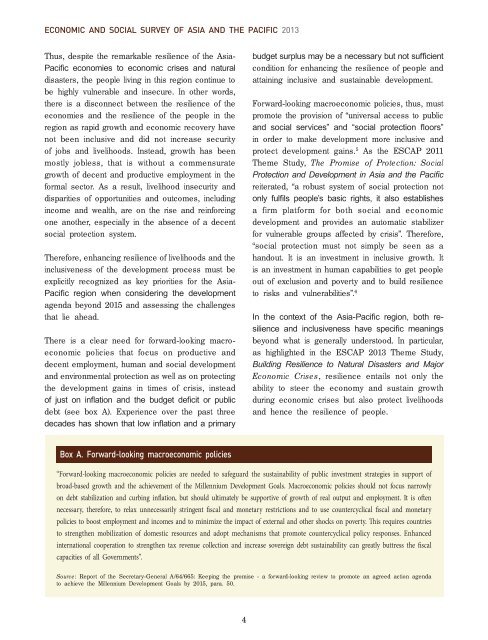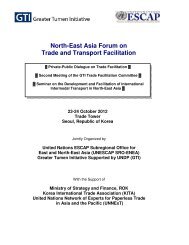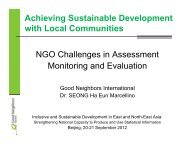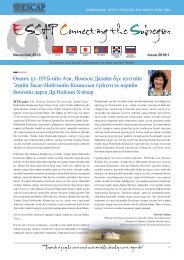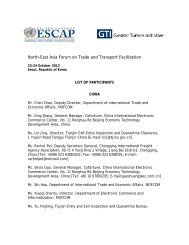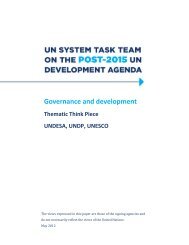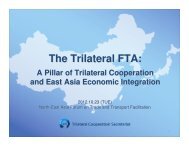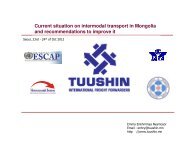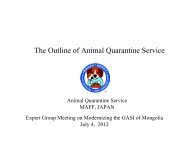Full Report - Subregional Office for East and North-East Asia - escap
Full Report - Subregional Office for East and North-East Asia - escap
Full Report - Subregional Office for East and North-East Asia - escap
You also want an ePaper? Increase the reach of your titles
YUMPU automatically turns print PDFs into web optimized ePapers that Google loves.
ECONOMIC AND SOCIAL SURVEY OF ASIA AND THE PACIFIC 2013<br />
Thus, despite the remarkable resilience of the <strong>Asia</strong>-<br />
Pacific economies to economic crises <strong>and</strong> natural<br />
disasters, the people living in this region continue to<br />
be highly vulnerable <strong>and</strong> insecure. In other words,<br />
there is a disconnect between the resilience of the<br />
economies <strong>and</strong> the resilience of the people in the<br />
region as rapid growth <strong>and</strong> economic recovery have<br />
not been inclusive <strong>and</strong> did not increase security<br />
of jobs <strong>and</strong> livelihoods. Instead, growth has been<br />
mostly jobless, that is without a commensurate<br />
growth of decent <strong>and</strong> productive employment in the<br />
<strong>for</strong>mal sector. As a result, livelihood insecurity <strong>and</strong><br />
disparities of opportunities <strong>and</strong> outcomes, including<br />
income <strong>and</strong> wealth, are on the rise <strong>and</strong> rein<strong>for</strong>cing<br />
one another, especially in the absence of a decent<br />
social protection system.<br />
There<strong>for</strong>e, enhancing resilience of livelihoods <strong>and</strong> the<br />
inclusiveness of the development process must be<br />
explicitly recognized as key priorities <strong>for</strong> the <strong>Asia</strong>-<br />
Pacific region when considering the development<br />
agenda beyond 2015 <strong>and</strong> assessing the challenges<br />
that lie ahead.<br />
There is a clear need <strong>for</strong> <strong>for</strong>ward-looking macroeconomic<br />
policies that focus on productive <strong>and</strong><br />
decent employment, human <strong>and</strong> social development<br />
<strong>and</strong> environmental protection as well as on protecting<br />
the development gains in times of crisis, instead<br />
of just on inflation <strong>and</strong> the budget deficit or public<br />
debt (see box A). Experience over the past three<br />
decades has shown that low inflation <strong>and</strong> a primary<br />
budget surplus may be a necessary but not sufficient<br />
condition <strong>for</strong> enhancing the resilience of people <strong>and</strong><br />
attaining inclusive <strong>and</strong> sustainable development.<br />
Forward-looking macroeconomic policies, thus, must<br />
promote the provision of “universal access to public<br />
<strong>and</strong> social services” <strong>and</strong> “social protection floors”<br />
in order to make development more inclusive <strong>and</strong><br />
protect development gains. 5 As the ESCAP 2011<br />
Theme Study, The Promise of Protection: Social<br />
Protection <strong>and</strong> Development in <strong>Asia</strong> <strong>and</strong> the Pacific<br />
reiterated, “a robust system of social protection not<br />
only fulfils people’s basic rights, it also establishes<br />
a firm plat<strong>for</strong>m <strong>for</strong> both social <strong>and</strong> economic<br />
development <strong>and</strong> provides an automatic stabilizer<br />
<strong>for</strong> vulnerable groups affected by crisis”. There<strong>for</strong>e,<br />
“social protection must not simply be seen as a<br />
h<strong>and</strong>out. It is an investment in inclusive growth. It<br />
is an investment in human capabilities to get people<br />
out of exclusion <strong>and</strong> poverty <strong>and</strong> to build resilience<br />
to risks <strong>and</strong> vulnerabilities”. 6<br />
In the context of the <strong>Asia</strong>-Pacific region, both resilience<br />
<strong>and</strong> inclusiveness have specific meanings<br />
beyond what is generally understood. In particular,<br />
as highlighted in the ESCAP 2013 Theme Study,<br />
Building Resilience to Natural Disasters <strong>and</strong> Major<br />
Economic Crises, resilience entails not only the<br />
ability to steer the economy <strong>and</strong> sustain growth<br />
during economic crises but also protect livelihoods<br />
<strong>and</strong> hence the resilience of people.<br />
Box A. Forward-looking macroeconomic policies<br />
“Forward-looking macroeconomic policies are needed to safeguard the sustainability of public investment strategies in support of<br />
broad-based growth <strong>and</strong> the achievement of the Millennium Development Goals. Macroeconomic policies should not focus narrowly<br />
on debt stabilization <strong>and</strong> curbing inflation, but should ultimately be supportive of growth of real output <strong>and</strong> employment. It is often<br />
necessary, there<strong>for</strong>e, to relax unnecessarily stringent fiscal <strong>and</strong> monetary restrictions <strong>and</strong> to use countercyclical fiscal <strong>and</strong> monetary<br />
policies to boost employment <strong>and</strong> incomes <strong>and</strong> to minimize the impact of external <strong>and</strong> other shocks on poverty. This requires countries<br />
to strengthen mobilization of domestic resources <strong>and</strong> adopt mechanisms that promote countercyclical policy responses. Enhanced<br />
international cooperation to strengthen tax revenue collection <strong>and</strong> increase sovereign debt sustainability can greatly buttress the fiscal<br />
capacities of all Governments”.<br />
Source: <strong>Report</strong> of the Secretary-General A/64/665: Keeping the promise - a <strong>for</strong>ward-looking review to promote an agreed action agenda<br />
to achieve the Millennium Development Goals by 2015, para. 50.<br />
4


